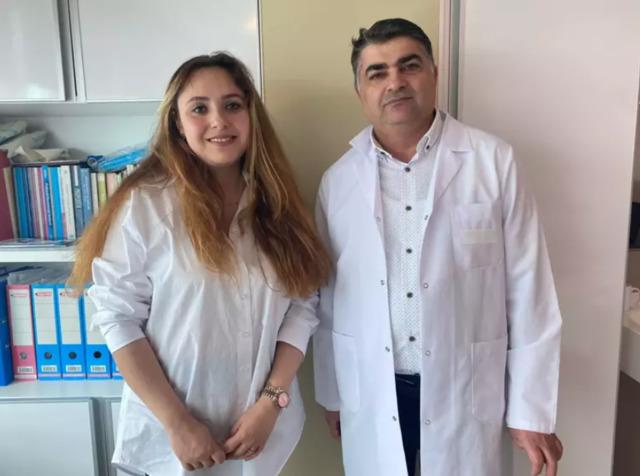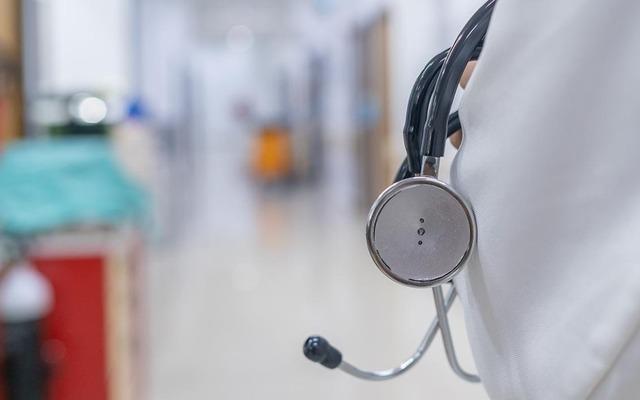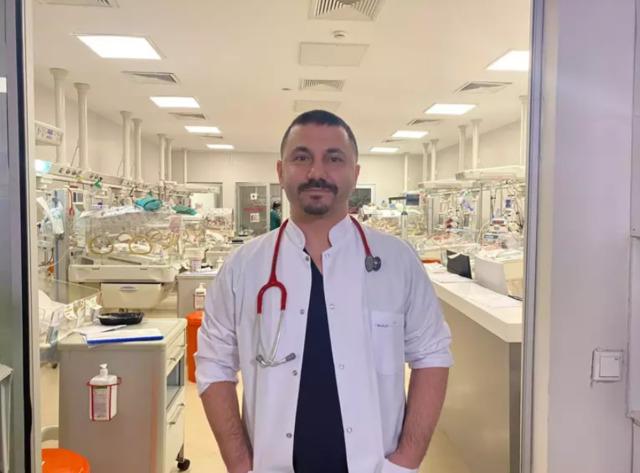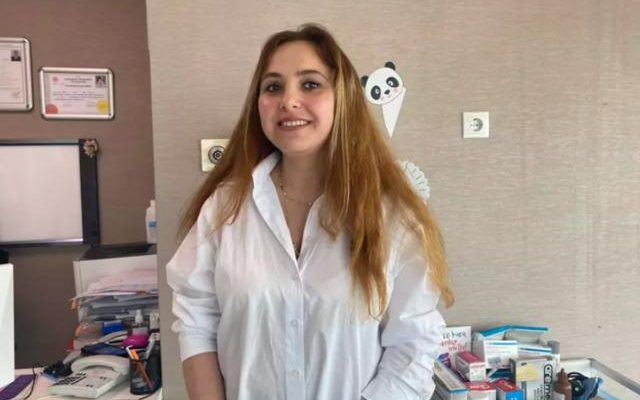The sisters, who had ‘intestinal paralysis’ a year apart, entered the literature. It was quite surprising that this disease, which has a prevalence of 1 in 5 thousand in the society, was seen in two sisters.
IT IS RARE IN GIRLS
Hirschsprung (intestinal paralysis) disease, which occurs when nerve cells stop growing towards the end of the intestine during the baby’s development in the womb and manifests itself in the inability to pass stool, is rare in girls. Pediatric Surgeon Prof. Lilya, who is now 1.5 years old, and Ela Karan, who is 2 weeks old, are receiving treatment. Dr. Süleyman Çelebi took responsibility. Prof. said that the only treatment for the disease is surgery and that if left untreated, it can lead to sepsis and endanger life. Dr. Çelebi said, “We replaced the part of the intestine that contains nerve cells with the part that does not. We treated Lilya last year, and we saw the same symptoms in Ela, who was born a year and a half later, and we operated. The siblings are in good condition, the surgery was successful.”
THERE WERE COMPLAINTS OF GREEN VOMITING
Burcu Karan, a mother of three children living in Istanbul, gave birth to her second child, Lilya, a year and a half ago. Mother Karan took Lilya, who passed her first stool after 36 hours after birth and had green vomiting complaints, to the hospital. After the doctors examined her, she went home after the doctors said there was “no problem”. This time, baby Lilya could not defecate for 4 days and could not gain weight no matter how much she fed during this period. Later, the family started looking for a doctor and turned to Pediatric Surgeon Prof. from Medical Park Bahçelievler Hospital. Dr. He reached Süleyman Çelebi. Prof. Dr. As a result of his examinations, Çelebi made the diagnosis in the first 24 hours and said that baby Lilya, who was only 20 days old, had Hirschsprung (intestinal paralysis). Thereupon, baby Lilya came to Prof. Dr. Çelebi was taken into surgery and regained his health after approximately 2 hours of surgery.

HE WAS INTUBATED FOR 24 HOURS
After a year and a half, mother Karan welcomed her third child, Ela. The mother, who encountered the same symptoms in Ela, went to Prof again. Dr. He reached Çelebi. Thereupon, baby Ela, who is only 10 days old, went to Prof. Dr. He was operated on by Çelebi. Baby Ela, who was intubated for 24 hours to rest the intestines after the surgery, regained her health and was discharged.
“WE CAN SAY IT IS THE FIRST CASE IN THE LITERATURE”
Prof. said that this is the first time this disease affecting the same intestinal segment has been seen in two sisters. Dr. Çelebi said, “This disease is actually a rare condition, its prevalence in society is 1 in 5 thousand. Approximately 4-5 times this rate is seen in men. It is extremely rare in girls. However, we diagnosed two female babies as both having Hirschsprung. Both of their nerve-containing cells were in the same segment. We made a search in the literature. “Sometimes nerve cells are localized in different segments such as the small intestine, large intestine or the lower part of the intestine, but we can say that this is the first case in the literature that they remain in the same segments,” he said.
KARAN: HE COULD NOT DEFEAST FOR 3-4 DAYS
Explaining the process of meeting the disease, mother Burcu Karan said, “After my first daughter Lilya was born, she could not defecate. Normally, he had to defecate within the first 24 hours, but he could not, and this was his first symptom. Then he had his first stool at the end of 36 hours, and then we went home. After coming home, my daughter did not want to be fed. After a while, she started to vomit green. After vomiting green, I called our doctor and asked, ‘Is there any problem in vomiting green?’ I asked. My doctor said, ‘No, there is no problem, babies can vomit green.’ A week passed like this. During this period, my daughter became constipated and could not defecate for 3-4 days. You know, there is no smell when babies pass gas, but when our baby passed gas, there was an incredibly bad smell. My baby wasn’t gaining weight, so we went to the hospital again. They said the nutrition was inadequate. But actually he was eating enough but he couldn’t even gain 10 grams. Then we went to another hospital. They started detailed research in that hospital. However, they said there was no problem and sent us home. However, my baby did not breastfeed at all for 1 day and his belly was swollen. This time, we went to the emergency room of Medical Park Bahçelievler Hospital at night. Our teacher Süleyman made the diagnosis here within 24 hours. “My daughter was taken into surgery and the surgery was very successful,” he said.

“MY DAUGHTER IS PERFECT”
Mother Karan, who also experienced the same symptoms in her daughter Ela, said, “My daughter Ela was born 1 and a half years later. Ela also defecated in the same way at the 32nd hour. We came home and she showed the same symptoms as my other daughter at home, she stopped breastfeeding, was in a weak state and had a different expression on her face. Then we went back to the same hospital. They had their own defecation done at the hospital. Then we came home and there was no problem in the morning. Then the symptoms started showing up again, so we went back to the hospital. We told him that his sister had Hirschsprung, but since it was a rare condition, they thought there was no such thing. I never thought that the same thing would happen to this baby of mine because there is no example of this in the world. My wife and I were devastated when we found out, because we definitely did not expect something like this to happen the second time. We immediately called Süleyman Hodja and explained the situation. Teacher Süleyman was also surprised, he did not expect such a thing either. After coming to Süleyman Hodja, the disease was diagnosed within 12 hours and it was confirmed that it was Hirschsprung. He had surgery 1 week later, and his health condition is very good now. Actually, this disease is not that bad, it is just that the surgery process is difficult. Once you make him a successful doctor, there is no problem. Prof. Dr. I would like to thank my teacher Süleyman Çelebi very much. “My daughter is fine,” he said.
PROF. DR. ÇELEBI: WE STARTED FOLLOWING IT BECAUSE IT IS COMPATIBLE WITH HIRSCHSPRUNG
Pediatric Surgeon Prof. Dr. Süleyman Çelebi said, “When baby Ela first came to us, she was 3-4 days old. He was a baby born at normal time, but his weight was lower than babies born at normal time, there was no problem in terms of appearance, there was no abdominal swelling. However, since we knew that his older sister had previously had Hirschsprung and had surgery, we were obviously suspicious because this was our baby’s second day of defecation. “We started to follow up because the examinations and films we made were compatible with Hirschsprung,” he said.

“THE INTESTINE ALSO HAS ITS OWN BRAIN”
Explaining Hirschsprung’s disease, Prof. Dr. Çelebi said, “Actually, the intestine also has its own brain. As a society, we ignore this and give names to every problem such as constipation and gas pain, but there is a disease we call Hirschsprung. This is a situation where the intestine’s own developmental brain is not fully formed. After the 7th week while the baby is in the womb, cells begin to migrate from its own brain. In a way, it equips the intestine with its own brain. This migration can sometimes stop at a certain stage due to a situation we do not know the reason for. Whatever position it stands in, the parts that do not reach the nerve cell are affected by that nerve activity and do not work. In this case, while the body can bring feces up to a certain segment, it is forced to stop and have difficulty in places where there are no nerve cells. “This stage turns into a normal situation when it is diagnosed both radiologically and pathologically and the non-functioning segment is removed by entering through the anus and the segment containing nerve cells is lowered there,” he said.
“IF SURGERY IS DELAYED, IT MAY CAUSE SEPSIS”
Stating that the disease is a rare condition, Prof. Dr. Çelebi said, “When these surgeries are postponed, the infection we call sepsis progresses and can cause growth and development retardation and serious problems in older children. Sometimes, if the intestinal segment that does not contain this nerve is short, persistent constipation occurs. This is actually a rare thing, the frequency of occurrence in society is 1 in 5 thousand. Approximately 4-5 times of this number are men. “It is extremely rare in girls, in fact we almost never see it,” he said.

“WE ARE FIRST SHOOTING THE INTESTINE MOVIE”
Prof. Dr. Çelebi said, “If a baby does not poop on the first day, then his/her belly swells and vomits green, then there is a high probability that he/she has Hirschsprung disease. That’s why it should be examined. In the diagnosis of the disease, we first take a radiological intestinal film. We visualize the nerve conduction of those intestines with our own eyes, based on narrow and wide areas. For a definitive diagnosis, a piece of the intestine is sent to the pathologist during the surgery. “The pathologist tells us the number, presence and absence of nerve cells, and we organize the surgery accordingly,” he said.
“THESE SURGERY ARE MAKING YOU SMILE”
Prof. said that the nervous system of the intestine also controls bacteria. Dr. Çelebi said, “If the intestines work late, the bacteria in the intestines begin to multiply more than normal. Bacteria that multiply too much can cause conditions such as sepsis and infection that can lead to death of the child. Baby Ela is in good condition now. These surgeries are satisfactory surgeries. Because once you get the part containing the nerve cells there, you know that everything will be fine. Both girls have Hirschsprung disease and their nerve-containing cells are in the same segment. We made a search in the literature. “Sometimes nerve cells are kept in different segments such as the small intestine, large intestine or the lower part of the intestine, but we can say that this is the first case in the literature that they are kept in the same segments,” he said.

BABAYİĞİT: AFTER THE SURGERY, WE INTUBATE THE INTESTINES FOR 24 HOURS TO REST
Newborn Specialist Dr. Aslan Babayiğit said:
“Ela baby’s sister also had surgery due to a similar condition. After he was born, he was admitted to the neonatal intensive care unit because he vomited after feeding. Since her sister had similar complaints, the diagnosis was made in a short time, examinations were performed and surgery preparations began. After the surgery, the baby remained intubated for 1 day. We weaned him from the ventilator on the second day. We started to feed him slowly, then increased his nutrition, we stopped the serum, now his general condition is good, he is waiting for the treatment to be completed. “We generally intubate these patients for 24 hours after surgery to rest the intestines.”
(DHA)

